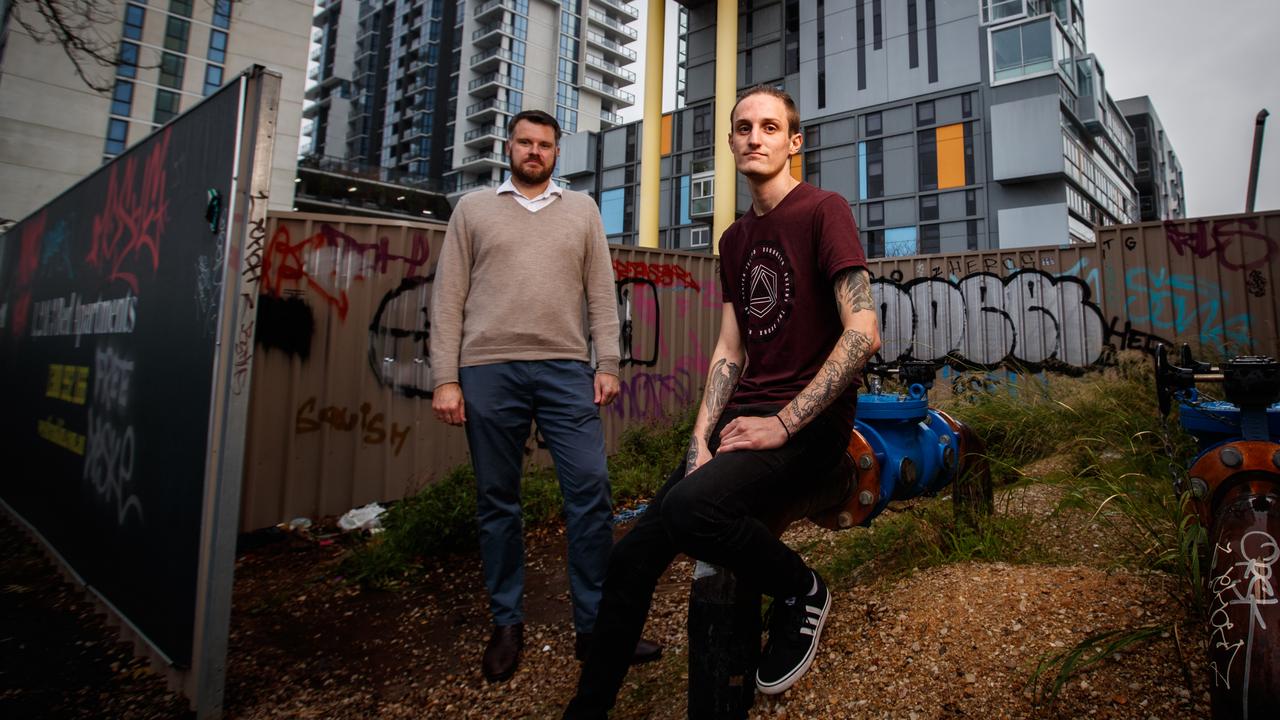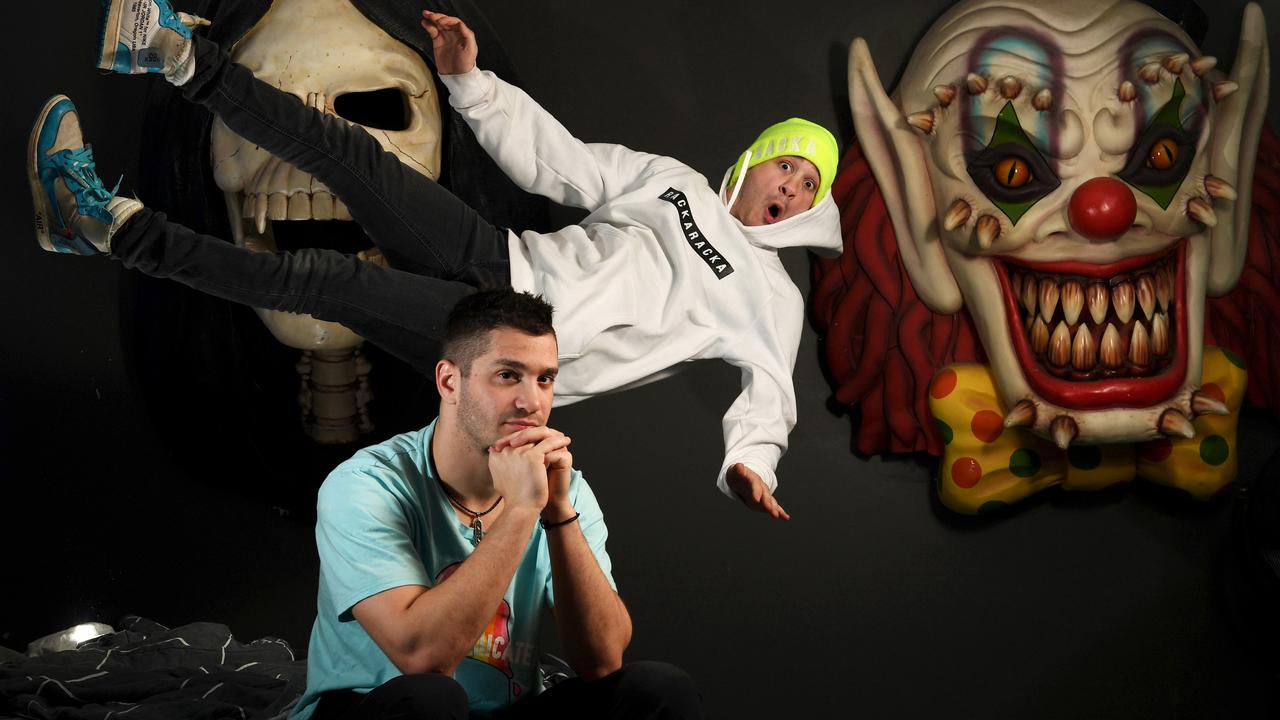Adelaide identity Quentin Kenihan’s memoir Not All Superheroes Wear Capes about to hit the shops
QUENTIN KENIHAN pulls no punches in a memoir that recounts family strain and stress, why he feels he’ll never find true love, and how you should never stop chasing your dreams.
SA Weekend
Don't miss out on the headlines from SA Weekend. Followed categories will be added to My News.
IT’S the curse of the child star. Audiences take you into their hearts when you’re young and adorable. You grow up bathed in the glow of starlight. Then puberty hits, which can be inconvenient, at best. Young adulthood is likely to be downright troublesome. Just ask Macauley Culkin or Daniel Radcliffe. But middle age? Thinning hair, spreading middle, aches and pains and — perhaps worst of all — that nagging anxiety about what you’ve achieved in a life half lived.
Quentin Kenihan has passed — not at all smoothly — through the first three phases and, against all expectations, arrived at the fourth. The “most fragile boy in the world” as Mike Willesee called him on national television when he was seven years old, is now 41. His cute phase is well and truly behind him. He has struggled with addiction to painkillers and booze and suffered crippling bouts of depression that left him suicidal.
On camera, the cute kid in the wheelchair grew into a teenager with attitude and then into the star of the Quentin Crashes ... series of TV specials, rubbing people up the wrong way in all the right places. And not just stars like Jennifer Lopez, whose frock he famously ran over and ripped as he pursued her down the red carpet at the Academy Awards in 2001. He has irritated plenty of viewers, too. Public comments on online archives of the Quentin Crashes ... series of TV specials are typically poisonous. And as an avid user of social media — “my friends tell me I’m an over-sharer” — he’s a frequent target for trolls. Offline, too, he cops his share of derision. “Just now, as I was coming here, I was called a f***ing maggot,” he says on the day we meet. But Kenihan has always given as good or better than he gets. He shot back at his abuser, a homeless man: “Yeah, mate, I’m a f***ing maggot with a roof over my head and a job.”
Despite the encounter in Victoria Square, he’s upbeat. His memoir Not All Superheroes Wear Capes is about to hit the shops, and he is loving his fortnightly gig on ABC Radio 891, an interview show called Big.

It’s not always so. The multiple fractures Kenihan has suffered since birth due to osteogenesis imperfecta, or “brittle bones” disease, combined with numerous surgeries, have left his body so bound up with scar tissue and arthritis that he exists on a daily regimen of painkillers — counted out by his carer and prescribed under close supervision by his doctor.
Some days, the pain is so severe that he can barely get out of bed. Not that he can do that, even on a good day, without the help of his carer. He takes antidepressants to keep the black dog at bay and sees a psychologist regularly to help him deal with the lot life has dealt him.
“You go to a doctor to get your body fixed and you go to a psychologist to get your head fixed. It’s just the same,” he says. “I don’t feel any shame about it, whereas I used to.”
Having lived much of his life in the public eye, Kenihan’s story is well known. That first appearance with Willesee in 1983 was one of the highest rating shows on television — apparently more people watched it than that year’s AFL Grand Final. He had actually made his TV debut at six months old, appearing with his mother, journalist Kerry Kenihan, in an interview with Mike Walsh. As part of a deal with Channel 9 dating back to the first Willesee special and running through to his 18th birthday, viewers had regular updates on the world of Quentin Kenihan. He has been on Young Talent Time, The Midday Show, Neighbours, The Panel. He’s had a regular film review slot on local ABC radio. Made a couple of films and had a role in Mad Max: Fury Road. He’s a familiar figure on the streets of Adelaide and counts among his friends stars like Ray Martin and Russell Crowe.
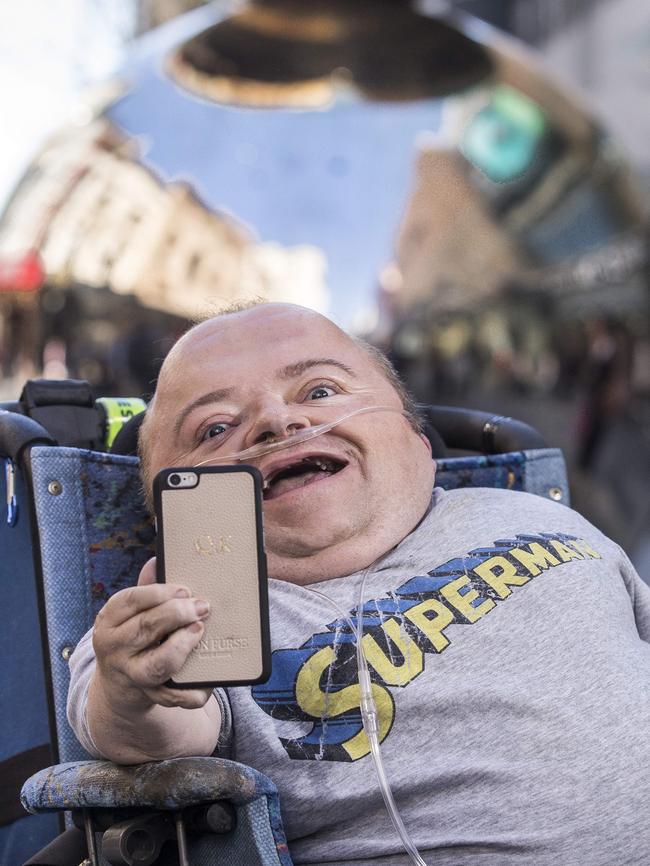
Was there anything left for an over-sharer to tell, then, in a 300-page memoir? It turns out there was, and not all of it reflects well on him, or, more especially, his parents, the late Geoffrey Kenihan and his mother Kerry.
He says now that he has forgiven his parents for sending him to the Regency Park Centre for the Young Disabled in 1985??, a place he had previously visited for post-operative rehab and respite for his family. For three years, however, it was his home. He felt abandoned. His parents rarely visited, he writes. He resented being the subject of his mother’s book on his life, and being wheeled out for publicity. Then, after another request from Willesee, and the promise of an appearance fee, Kenihan was brought home for a few days. “I hated my parents at the time because they’d left me in that place alone, but I had to suck it up and pretend we were all happy families and that my mother and father were both good parents. I didn’t think they were.”
There are accounts of his parents’ drinking and fighting, of them being so wrapped up in themselves and their work that much of his care was left to his older brother Myles. “Myles would usually tuck me into bed and, on rare occasions, Mum and Dad would come and do the Joan Crawford act — tiptoeing into our bedrooms, asking us individually how much we loved them,” writes Kenihan. “I found it quite horrifying, and I could smell the alcohol on their breaths.”
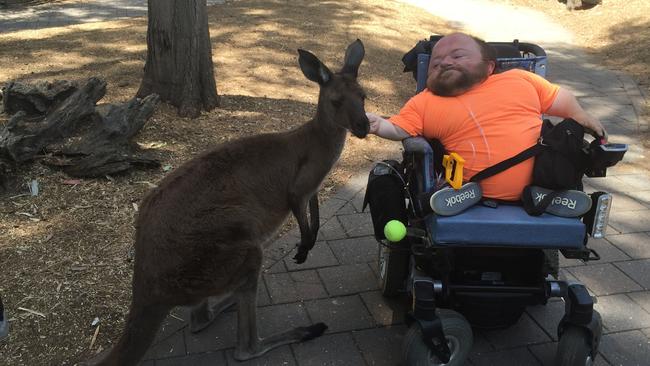
Later in the book, he describes how, when he was 18, his father pressured him into releasing money from the trust fund which held his TV appearance fees so that he could bail out the family PR company. “I went to the bank and discovered there wasn’t $17,000 as I had hoped for, but a mere $7000,” he writes. He goes on to accuse his father of stealing from him to pay for his mother’s international travel. “I was so angry.”
In person, and in hindsight, Kenihan is philosophical. He made his peace with his father before his death in 2005, and he has reconciled with his mother. “Did they do some crappy stuff? Yeah. It’s crappy stuff that I’ll never forget, but they’re human and my life is not infinite,” he says. “I’m going to probably be dead before a lot of people so I could spend my time being angry at them and hating them, but what does that achieve?”
He’s also learned to see his childhood from their perspective, to acknowledge the stress on them and their relationship — the marriage broke down when Kenihan was in high school??? – involved in raising a profoundly disabled boy. “It was shattering,” he says. “And (Mum) just couldn’t get a handle on it. It was too confronting, and she would always fall back to the thing that she knew how to do, her writing and her work. And she was probably suffering in herself, with guilt, and, if you think about her mental health at that time, she probably wasn’t in a great space. There wasn’t the support then. I remember she would go see a shrink and all the shrink would say was, ‘Here take a pill’. That didn’t help her.”
For the present, he says “I take every day as it comes”. He’s enjoying his radio slot, is active in the charity Touched By Olivia, which campaigns for disabled access in playgrounds, and would love to do more filmmaking. That career, however, is stalled. “I’d love to be a successful filmmaker but it’s no way to make a living,” he says. In the absence of a US-style studio system, here filmmakers had to pitch their ideas to government bodies for grants or loans. “There’s just too much nepotism in filmmaking,” he complains. “You know people at Screen Australia who used to work at some other company, so that company gets funded and you don’t.”
He concedes that that might have something to do with his own ideas not making the cut. “That’s probably part of it but I also think that the landscape has changed. Anyone with a computer and Final Cut Pro and a good DSLR camera can pick it up and go start making films. But what I wanted to do was to create a point of difference,” he adds. “To show that a person with a disability can be a filmmaker, can be an actor and can get the job done. And I kind of broke that ceiling a little, but it still hasn’t broken through. We’re kind of the last minority. We can have gay filmmakers and actors, indigenous filmmakers and actors but God forbid there’s a disabled filmmaker and disabled actor playing an actual disabled role. Screen Australia’s whole thing at the moment is diversity. Well, it’s not really.”
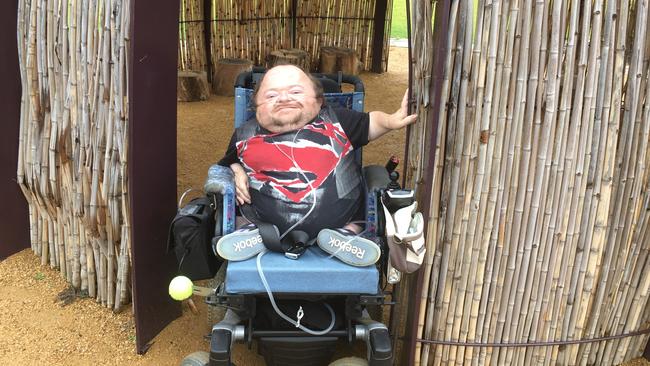
His biggest regret, however, is that it’s unlikely he will ever find love. He devotes a chapter entitled to his sexual initiation, first by a generous friend who helped him “christen” his new home, and then in a brothel, where he became a regular for a time. “I haven’t paid for sex in over 18 months,” he writes. “I’m not going to again.” There would be no more sex unless it was in a committed relationship. And that, he has accepted, is an unlikely prospect.
“That’s the thing I still struggle with … the thing that most irks me,” he says. “I’ve come to terms with the fact that I’m not Brad Pitt. Even though The Advertiser voted me one of Adelaide’s most eligible bachelors, I don’t actually think I am.”
“Nah,” he says when asked if he thought that was patronising. “It’s funny. I was like ‘finally!’ I think it was a hoot. I actually said on Facebook ‘line up ladies’.”
Writing the book had been an intense and painful process, taking him back to some dark places. He would compose it in his head, then dictate his words into his iPhone, and a friend would type up his words. “That’s something my dad taught me to do. To write in my head.” An earlier publishing contract had been abandoned because they wanted him to be “less angsty” and to include more celebrity gossip. This time around, it would be “warts and all” he told Hachette Australia. “I just thought, if I’m going to do this, I can’t sugar-coat it,” he says.
His aim, he adds, was not to seek sympathy, or to give readers an insight into what it’s like to grow up profoundly disabled. It was to inspire others to follow their dreams. “I’ve accomplished every career dream I’ve ever had,” he says. “And I’ve done some crazy shit. And yeah, you could say that, up until the age of 15, it was because he was ‘the little Aussie battler’, but beyond that it’s because I’ve worked my arse off, and put myself out there.
“And I wanted to show people that if this guy can do it, maybe they can follow their dreams too.”
Not All Superheroes Wear Capes by Quentin Kenihan, Hachette Australia, $32.99, is published in October.

